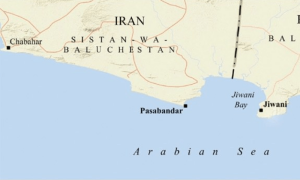KARACHI, Feb 12: The Sindh High Court directed the Karachi Electricity Supply Corporation on Tuesday to sever power supply to five unauthorized floors of a commercial-cum-residential building in Lyari immediately to facilitate its demolition by the Karachi Building Control Authority within 15 days.
A neighbouring resident complained that a builder had raised a multi-storeyed structure on plot 1594, Street B/2, near Madina Masjid, Khadda Market, Lyari Town. After obtaining KBCA approval for a ground-plus-one-floor residential structure, he built shops on the ground floor and flats on the first floor and then proceeded to build a whole lot of five additional floors without any sanction and despite KBCA notices and warnings, allegedly with police connivance.
The builder also flouted a court order restraining him from raising further construction when he had already built four storeys. The KBCA attempts to demolish the building were frustrated. The shops and flats were sold in violation of court orders and KBCA notices and were occupied by the buyers. No demolition could be undertaken without eviction of illegal occupants. Police declined to provide any assistance to the KBCA and the KESC and the Sui Southern Gas Company sanctioned connections to the builder and the occupants.
In its order on Tuesday, a division bench comprising Justices Munib Ahmed Khan and Farrukh Zia G. Shaikh told the KESC to snap power supply without delay. Police were ordered through the Lyari town police officer to help evict the illegal occupants. The KBCA was directed to demolish all five additional storeys within two weeks and report compliance.
Further hearing was adjourned to March 5.
Advocates Shahid Jamil Khan and Abdul Jabbar Korai, representing the KBCA and the petitioner, the builder might have refrained from violating the court order if the police had not protected the offending builder and the public utilities had refused connections. The violations were verified by the court nazir but to no avail.
Notices to EC, govt
A division bench consisting of Justices Azizullah M. Memon and Arshad Noor Khan issued notices to the federation, the Election Commission and other respondents for Feb 14 in a petition seeking enfranchisement of a number of residents of the area comprised in the National Assembly constituency 242.
Moulvi Iqbal Haider, an Awami Himayat Tehrik candidate, and six residents complained in their petition that a large number of residents, mostly of Bengali, Bihari and Burmese extraction, had not been issued computerized national identity cards. They did have old, non-computerized NICs and their names also appeared on the previous voters list. But, they apprehended, they would not be allowed to cast their votes in the absence of CNICs. Many of them have been booked under the Foreigners Act. The petitioners said they were Pakistani citizens under the law and could not be denied CNICs or passports or the right to vote.
The petitioners requested the court to direct the election authorities to allow them and other residents to cast their ballots irrespective of whether their names were listed in the electoral rolls. The National Data and Registration Authority meanwhile be asked to issue them CNICs. Residents confined under the Foreigners Act should also be allowed to exercise their franchise. The police be restrained from harassing the Bengali, Burmese and other oppressed communities.
Lease cancellation
Justice Yasmin Abbasy dismissed a second appeal against the cancellation of lease of 750 acres in the district of Thatta.
The land was leased out to a fertilizer company in the private sector in 1982, initially for 10 years. It was extended in 1992, though the lessee had failed to utilize it for setting up a fertilizer factory. In fact, according to the provincial government, he obtained a hefty bank loan for the plant and mortgaged the land. When the lessee concern defaulted on repayment of loan, the creditor bank sued it and obtained a decree and moved for auction of the leased land in execution of the decree. The provincial government cancelled the lease and the lessee filed an appeal against the government decision. The appeal was dismissed by a district court and the lessee moved a second appeal in the high court.
Appearing for the provincial government, Assistant Advocate-General Agha Zaffir Ali and Advocate G. Haider Shaikh maintained that the appellant had already caused losses to the public exchequer by not utilizing the lease, by pawning government land to secure a bank loan and by not repaying the loan. A huge tract of 750 acres of state land was thus sought to be misappropriated by collusive litigation, they contended.












































